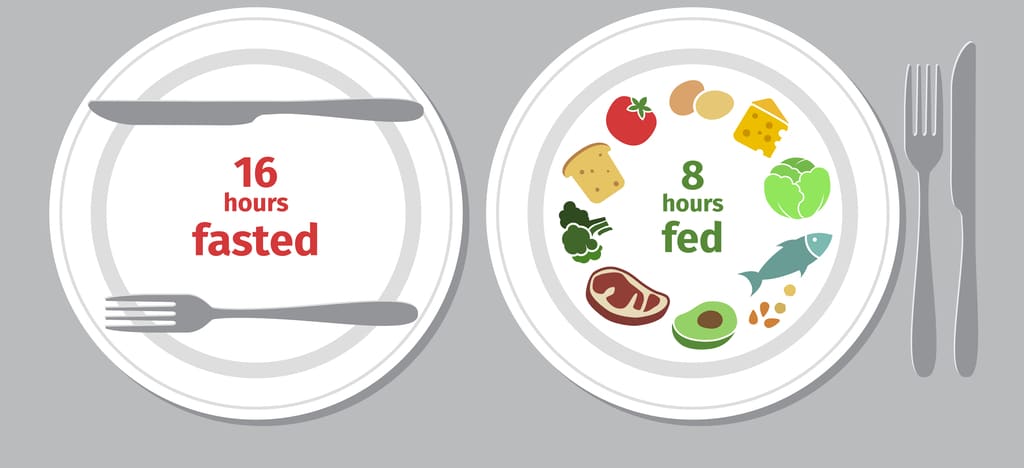How many of us have ever thought of losing weight or looking fitter? Most of us would have had this on our minds at least some time in our lives and most of us would have tried calorie counting, cutting out carbs, Atkin’s, Caveman or even the new ketogenic diet. One new approach is the Intermittent Fasting diet. This is not quite a ‘diet’ however, because there is no particular food recommended to eat.
What is Intermittent Fasting?
Intermittent fasting (IF) is a diet regime which alternates between periods of fasting, where there is little or no calorie intake, to periods of unrestricted eating. It typically entails abstinence from food and caloric beverages ranging from 12 hours to 16 hours. Its roots are derived from rituals used for spiritual (and health) benefits in early texts by Socrates, Plato and various religious groups. It is also believed to mimicking how the human body is meant to digest and assimilate foods. Food was scarce in the past and was only available on occasion with long periods of very little caloric intake in between.
It has become widely popular in recent years as it is touted to change the body composition with increased muscle mass and loss of fats, and is also associated with better blood pressure and cholesterol controls too[1].
Is Intermittent fasting increasing in popularity?
Yes it does seem be popular of late. There are 2 basic varieties of the IF diet. One is the time-restricted feeding. The commonest version of this is the 16:8 approach where there is a 16-hr fast and an 8-hr nutritional window. This may be altered to the 18:6 or even the more rigorous 20:4. Another approach is the 24-hr fasting period, alternated with a 24-hr eating period repeated two or three times a week. Here there is a 5/2 system where there is calorie restriction 2 days a week and a regular diet for 5 days.[2]
Many folks find that this method of dieting is a lot less restrictive as compared with the traditional method of calorie restriction. It really just involves taking a normal daily intake with a use of a short but strict calorie restriction.
What are the perceived benefits of regular fasting? Is there any medical-evidence to support these claims?
IF affects how fats are metabolized in the body. Fats are an energy storage module in the body. During the use of an IF diet, after meals, the glucose levels are elevated. But during the fasting periods, glucose levels fall and the body starts to metabolise fats and utilize ketones as the main source of energy for its functions. There is an increasing body of evidence which show that fat levels start to decrease with periods of intermittent fasting. This is measured with a decrease in low density lipoproteins (LDL) and total cholesterol (TC) levels.
High circulating levels of inflammatory factors have been identified as a cause of atherosclerotic plagues which is the major cause of heart attacks and stokes. It has been found that Intermittent Fasting reduces the levels of inflammation and thereby also reduces the risks of heart diseases and strokes as well. This is mainly due to the reduction in the levels of leptin and resistin which are produced in large amounts in people with large body mass index.
Blood pressure is also shown to decrease with intermittent fasting. The mechanism is attributed to the increase of parasympathetic activity during the fasting periods. Unfortunately the cardiovascular health benefits do not last longer than the period of the IF diet and blood pressure returns to the initial values after.
What are the risks or concerns associated with fasting? Are these risks associated with certain demographics?
IF is effective in supporting the healthy functioning of the cardiovascular system by reducing body fat and body mass. It also reduces the risk of metabolic syndrome by reducing the levels of fats and glucose concentrations – so the risk of diabetes is also reduced.
However, it can be a challenge to start with. The first few days of fasting is usually accompanied with a bad mood – and fatigue and dizziness as the body requires times to start using ketones effectively instead of glucose.
People with diabetes who are on anti-diabetic drugs such as metformin and the sulphonyureas should not fast as it can lead to severe hypoglycemia and even death. In the elderly, IF is associated with the risk of heart disease, heart rhythm irregularies and even stroke and as the glucose levels are fluctuating with IF, there is also an increased incidence of falls and fractures.
IF should not be used by children, pregnant women and people performing heavy physical work.
What is a healthy approach?
A good way to start would be to slowly increase the time of the fast. Time spent sleeping can be included too! Let’s take an example of a person who is keen on starting IF with a 16:8 schedule. He would have lunch at 12 noon, and has dinner completed by 8pm. His next meal would be lunch at noon again. This way he would be fasted from 8pm to 12 noon the next day! Just to be clear, water and black coffee are non-caloric beverages.
References
[1] https://www.hsph.harvard.edu/nutritionsource/healthy-weight/diet-reviews/intermittent-fasting/
[2] Intermittent Fasting in Cardiovascular Disorders—An Overview. Nutrients. Malinowski et al. Mar 2019.




































